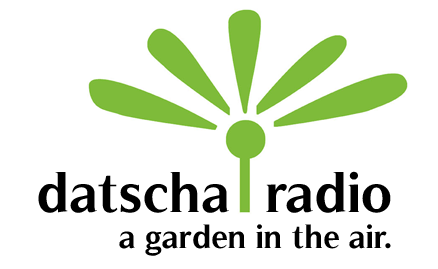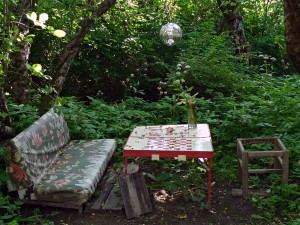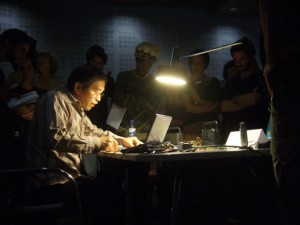The Reading Hour
Customary broadcast time: Mon 26th August -Fr. 31st August, 11-12 am. Exception: Sat. 25th August, 1-2 pm.
The Reading Hour is dedicated to a blend of prose, observations, meditations, poetry, specialist literature, radio play, interview and improvisation. The texts are read/spoken by their original authors, in some cases though, of course, they were recited by our Datscha-Radio speakers. A big effort was made to search for the most suitable music: Do you already know how many songs exist in the context of “morels” or “radishes”? What kind of track is suitable for a treatise on “gardening ants”?
The greatest part of the Reading Hours is rendered in German. For poetic and musical reasons though, they can still be recommended.
Reading Hour 1: Die Pilzstunde [The Mushroom Hour]
Sa. 25. August 13-14 h und 22-23 h auf reboot.fm
With texts by Wladimir Solouchin, Gabi Schaffner, Gustav Schenk, Knut Hamsun, Friedrich Nietzsche, Silvia Plath, John Cage, and mushroom hunting-video sounds from the Internet. Read by: Ulrike Stöhring, Matthias Scheliga, Michaela Schimun and Gabi Schaffner. Lots of music too.
Reading Hour 2: Rattengarten [Rat Garden]
So. 26. August, 11-12 h
After the same-titled story by Ulrike Stöhring. The second story by her is “Lippenblütler heilen den Kopf [Lamiaceae heal your mind]”. Supplemented by passages from “Geheimnisse des Küchengartens [Secrets of the kitchen garden]”, “Phänomene der Inneren Topografie [Phenomena of the Inner Topography]”, prose by H.C. Artmann, and poems by Bettina von Arnim, Theodor Storm, Heinrich Heine, Hans Christian Morgenstern and Georg Trakl. Read by: Ulrike Stöhring, Matthias Scheliga, Michaela Schimun and Gabi Schaffner.
Reading Hour 3: Wo die Seele aufblüht. [Where the Soul Unfolds] Doris Bewernitz’s live reading at Datscha-Radio
Mo. 27. August, 11-12 h
Where the Soul Unfolds – Why a Garden Makes You Happy. The title is deceiving, the book’s cover likewise. Bewernitz’ stories are neither placable nor esoteric. But finely observed descriptions of the garden world and its inhabitants… be it humans or animals.
Di. 28. August, 11-12 h
Reading Hour 4: Mirrors of Infinity – Garden and Radio Architecture (en)
A Talk with Allen S. Weiss and Pit Schultz
Allen Weiss’s analysis offers new insight into the major gardens of this period: Vaux-le-Vicomte, Chantilly, and Versailles.
From the Meditations of Descartes and Pascal’s Penss, to the intrigues of court politics, Weiss reveals in his book “Mirrors of Infinity” how the structure of these gardens reflects—sometimes literally—the power of Louis XIV, the relationship between God, King, sun, and infinity, and the new science of optics.
In terms of radio architecture, this talk touches on intriguing parallels between garden and broadcasting concepts. Highly interesting!
Mi. 29. August, 11-12 h
Reading Hour 5: Mit Alexander von Humboldt in den Garten der Natur [Into the Garden of Nature: Alexander von Humboldt]
Ms Kuni and Ms Schaffner leaf through the great Humboldt: Taxonomies, gymnosperns and angiosperms, convivial and less convivial trees, the poesis in the counting of plants and more… Supplemented by a chapter from Christian Grunert’s gardening book on the value of mallows in the garden and the phenomenon of the firebugs sitting on them (and on the hollyhock, Alcea, which also belongs into the family of the Malvaceae).
Do. 30. August, 11-12 h
Reading Hour 6: Epikur und Ameisen [Epicurus and the Ants]
The titels suggests some sort of surrealism, but in contemplation of the fact that “agricultural ant tribes” actually exist, a certain contiguity shines out.
“Graben, pflanzen, schneiden, pflücken, gießen, grillen, trinken,essen, plaudern, flirten, im Schatten oder in der Sonne dösen und vieles andere mehr gehören zu den Tätigkeiten im Garten, die es noch lange geben wird. Aber eine ganz wesentliche und einst sogar charakteristische Beschäftigung ist inzwischen seltener geworden und vielleicht auch schon ausgestorben. Das ist das Philosophieren im Garten.”
Dietmar Becker wrote a brilliant treatise dealing with the garden philosophy of Epicurus (published in adF 381 II/2007). Maurice Maeterlinck has written a book on “The life of the Ants” and there describes three tribes of the so called “gardening ants”. There are humans… and there are ants. Both gardeners. Plus: the Persian poet Rumi! The combination leaves many questions unanswered. That’s how it should be.
Both texts read by Matthias Scheliga; the Rumi poems read by Michaela Schimun.
Music: Brian Eno, Steve Reich und Faramarz Payvar.
Read More











